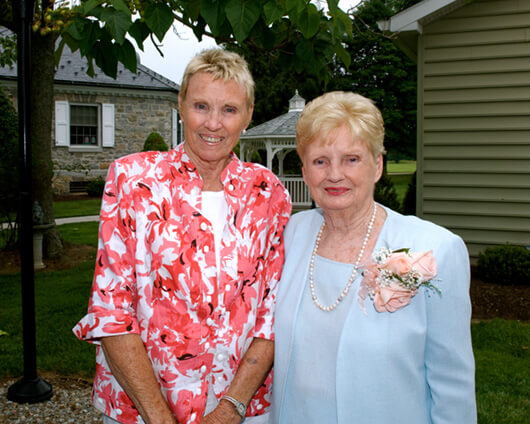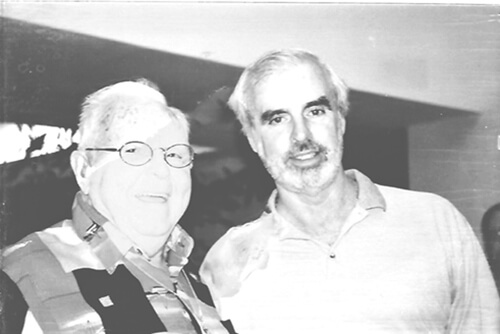February Alumni News
Ashley Participates in Parity Act Event on Capitol Hill
On Tuesday, January 24, 2017, The Kennedy Forum sponsored “The New Frontier of Mental Health and Addiction Conference” in Washington, DC. The New Frontier is a bold plan that helps outline what congress can do to address mental health and addiction regardless of party or committee, provides an overview of how parity implementation is tracked at the state level, and describes how consumers can be empowered and health plans held accountable for their actions.
(Martha Meehan-Cohen, Ashley’s Director of Alumni & Development with Patrick J. Kennedy)
The purpose of the event and related efforts is to help enforce the terms of the Mental Health Parity and Addiction Equity, and Patient Protection and Affordable Care Acts. These two pieces of legislation, among other things, help ensure that consumers in need of treatment for diseases of the brain receive care on a level with other diseases of the body.
Despite the implementation of these two laws, many insurance companies have failed to fully comply. The New Frontier plan will help fulfill the promise of this legislation by ensuring access to care, demanding better quality while lowering costs, and delivering better outcomes.
There is strong bipartisan support for the plan, evidenced by appearances at the event by leaders of both political parties, including Sen. John McCain (photo right), Rep. Nancy Pelosi (photo middle), and of course, former Rep. Patrick Kennedy (photo left), author of the Parity law and founder of the Kennedy Forum.
The Forum is encouraging consumers to mobilize by providing resources by which to register their complaints and tell their stories. Visit ParityRegistry.org for information on how to file an appeal and join their new complaint registry to help put an end to discrimination against those living with mental health conditions or addiction.
The Kennedy Forum was founded to serve as a vehicle to honor JFK’s effort, celebrate the progress, and identify areas that need improvement for the communities of mental illness, intellectual and developmental disabilities, and addiction. Learn more about the Kennedy Forum.
Mrs. Downtown DC America Partners With Ashley
Farzaneh Seifi is Mrs. Downtown DC America and competing for Mrs. DC on March 18th for a chance at the Mrs. America title. She partnered with Ashley in support of her cause, addiction and recovery, to raise awareness about the disease, advocate for treatment, and to diminish the stigma.
1. Why did you choose addiction awareness and recovery as your platform?
 Most of us know of somebody around us, in or out of our family circle, who is struggling with addiction. Most of these individuals are extremely kind, smart, and talented but their addiction takes hold of their best qualities. I have observed an individual and their families struggle emotionally, physically, financially, and legally when dealing when addiction.
Most of us know of somebody around us, in or out of our family circle, who is struggling with addiction. Most of these individuals are extremely kind, smart, and talented but their addiction takes hold of their best qualities. I have observed an individual and their families struggle emotionally, physically, financially, and legally when dealing when addiction.
I have noticed that most of who are imprisoned in the hands of addiction did not get there by choice and deep down in their heart they seek treatment and freedom from it— so do their families. But, due to the stigma and guilt associated with being an addict, many people can feel ashamed to ask for help.
Addiction is a disease. And like any kind of body disease (heart, diabetes, lung, etc), it needs to be treated. Many people are unaware about addiction being a scientifically proven brain disease and end up classifying it as a moral failing instead. Looking at the extremly high number of people struggling with substance-use disorder, those who are successful at recovering from addiction received the proper treatment needed. Proper treatment involves comprehensive, individualized, and professional care. I think bringing awareness to the disease of addiction and the treatment options for it, have been overly estimated.
As the titleholder of the Mrs. Downtown DC America 2017, and following the Mrs. DC America pageant’s excellent support of community services, I chose to collaborate with the Ashley Addiction Treatment and use my learning and my title to put effort into spreading awareness about addiction and its recovery. My hope and goal is that this will bring inspiration to many patients and specially their families, to not lose hope, stand strong, be informed of the right resources, and know that there are people out there who share their pain, are in effort to make the path to treatment easier, and have their back to help them.
2. In your opinion, what are the biggest obstacles when it comes to addiction treatment and recovery?
Addiction is a disease. And like any kind of body disease (heart, diabetes, lung, etc), it needs to be treated. Many people are unaware about addiction being a scientifically proven brain disease and end up classifying it as a moral failing instead. Looking at the extremely high number of people struggling with substance-use disorder, those who are successful at recovering from addiction received the proper treatment needed. Proper treatment involves comprehensive, individualized, and professional care. I think bringing awareness to the disease of addiction and the treatment options for it, have been overly estimated.
Many people may not have the means to get the quality addiction care they desperately need. Treatment that is evidence-based and compassionate needs to be more accessible to all. Another obstacle is making quality and professional treatment more accessible to everyone.
3. What advice would you give to an individual struggling with addiction or a family member who has a loved one struggling?
To the individual struggling with addiction: You are not alone in the darkness— your family is struggling with you. Admit that you have a problem and take action on it. By admitting you have a problem, your family will be there to help and support you. Put away all the excuses and say no to the voice you hear that keeps you paralyzed by the disease. Do not be ashamed of asking for help. Be stubborn and persistent about your recovery and learn to become flexible in changing your routines and lifestyle for recovery. Never give up, even though at times it is more difficult than other times to handle it. Try new activities, and stick with ones that bring you joy. It is never late to begin or to change. Stand up strong, stay positive, believe in yourself and you will proof those who doubted you wrong.
To the families of an addict: It is not your fault. You cannot control the disease. You cannot control your loved one, and the choices they make too. You can only control the way you react, and provide support. Stop policing and preaching your loved one and stop offering help when they refuse to take it. Learn about the disease and learn how to be of help to yourself and take care of yourself, while you are struggling with all the emotional and financial pain, and are strained with all the affects. Learn how to not enable out of love, but be of support at a proper time and in a proper way. Learn when to say no, how to define boundaries, when to privilege, punish, help, and let go. You cannot provide care for somebody who does not want the care. Your life matters, as much as the addict’s does. Remember you are not alone.
4. What do you think makes Ashley Addiction Treatment stand out from other treatment centers?
At Ashley, patients are treated with dignity, as humans who deserve to receive care and are believed in to maintain their recovery and stand up on their knees again. They are provided with professional help and support, from dedicated members, who not only provide inpatient care, but also help with resources and guidance for after care. The focus is not only on the physical aspect of the recovery but also on the emotional and spiritual. I have talked with many people at the center; addicts enter it troubled, sick, and hopeless, and graduate with feeling of serenity and purpose. The inspiration and the guidance they receive is the biggest gift you can give to one to start living again.
Along with all the wonderful care for the patient, they also provide programs for the families of the addict, free of charge, to teach them about the disease, and the proper ways to both care for themselves and their loved one. Ashley also provides opportunities for addicts to stay in touch after their graduation from the program, and consistently be involved to stay in the path of recovery. They also provide opportunities for the recovered ones to give back to the community, by lending a hand to ones in seek of treatment and inspiring them.
5. 50 years from now, where do you hope addiction and recovery will be compared to now?
My hope is that our social and legal system will have grown mature to provide appropriate support and resources for the addicts, to inspire and motivate them to seek recovery, and stay in it. That treatment will be offered with a low cost or even free of charge, and resources like Ashley Addiction Treatment will be available and accessible to anybody who needs it
Many factors determine the likelihood that someone will become an addict, including both inherited and environmental factors. I hope that public will have enough awareness about the disease, the ways to recover from it, and the methods to stay in it.
I also hope that there will be progress in medicine and human genetics, and there will be discoveries about how to use the knowledge to help with addiction prevention/recovery.
6. What is an inspirational quote you live by?
“Good, Better, Best
Never let it Rest,
Until your Good is better, and your Better is Best.”
“The point is consistent actions create consistent results! Keep Swimming!”




